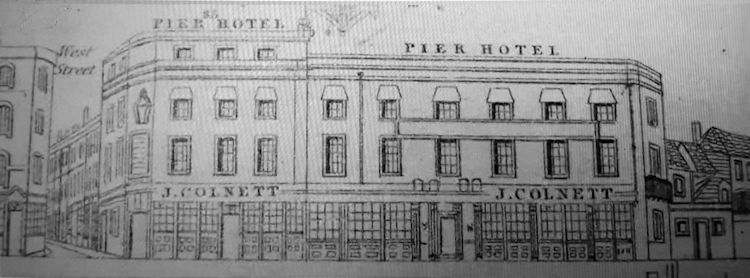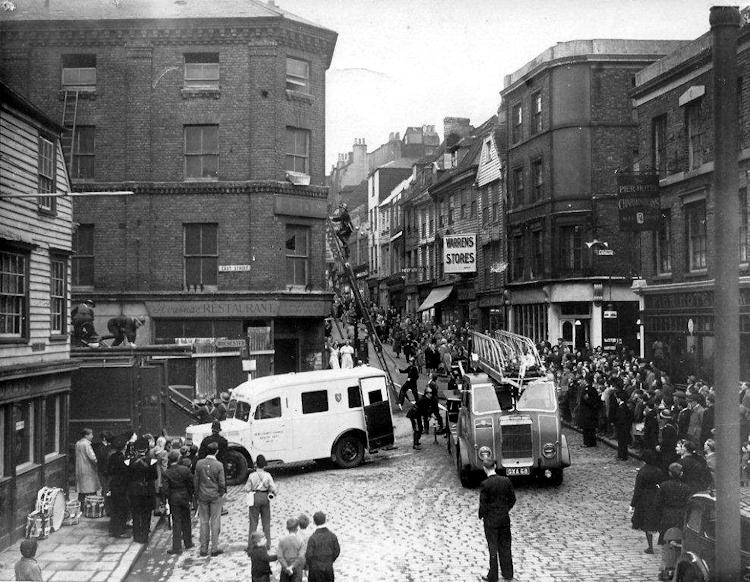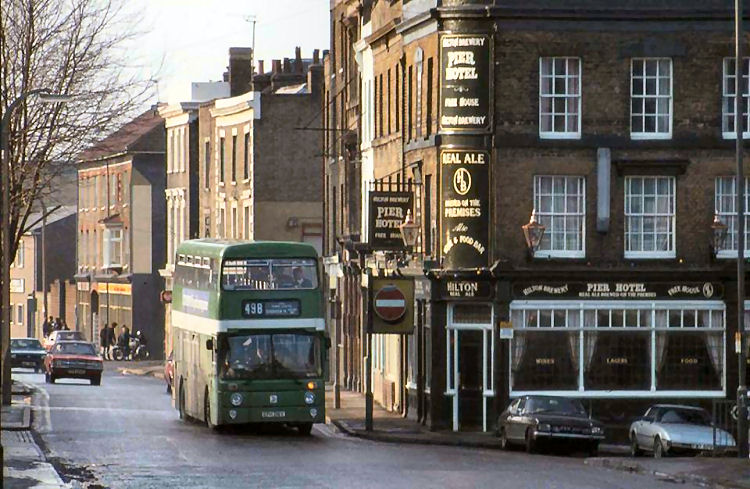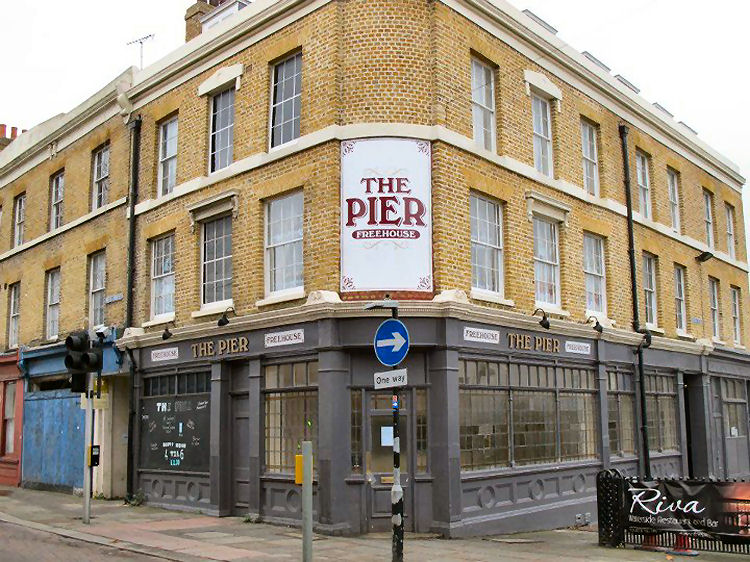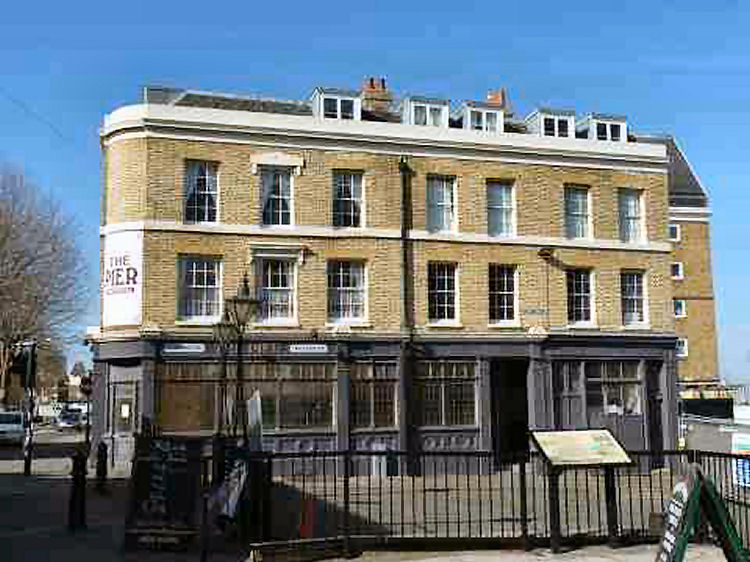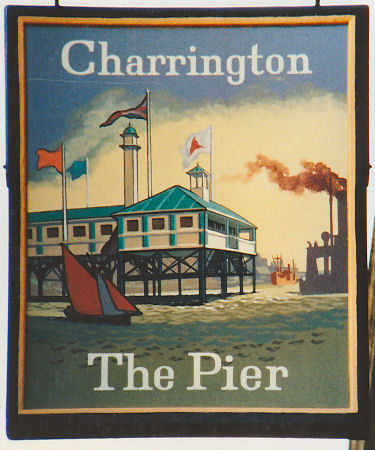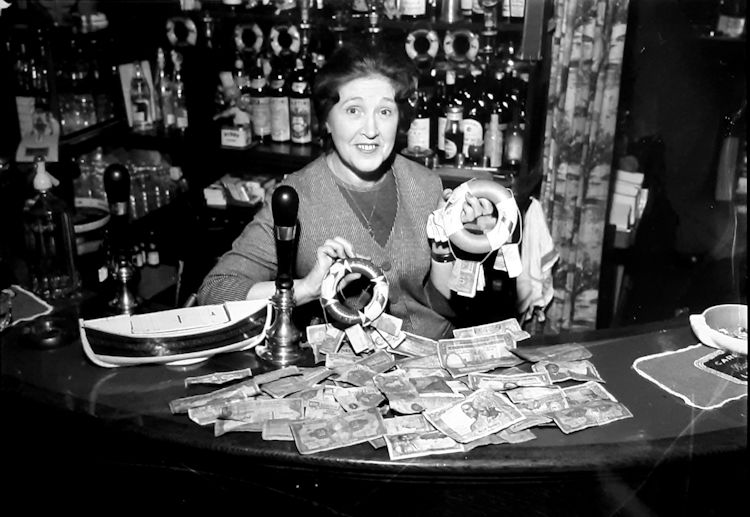|
From the South Eastern Gazette, Tuesday 24 November 1846.
Gravesend. Destructive fire. 46 houses burnt.
On Thursday night, about 12, a fire broke out in the house of Mr.
Garratt, grocer, West Street, close to the "Pier Hotel." An alarm
having been given, the Gravesend engines were, after some delay, by
no means creditable to the superintendent of them, brought to
the spot. In the meantime, the house, and that next to it (a
cookshop, kept by a Mrs. Petitt, were enveloped in flames. The wind,
blowing strong from the south, soon brought the flames to the
adjoining houses, and the opposite side of the street, and, in less
than an hour, eight houses were completely on fire. When the
Gravesend engines were prepared to be worked there was no water
plug to be found. After a search of some duration, one was
discovered; but from some cause no water issued therefrom. The fire
raged resistless. The Gravesend Bank and the houses adjoining it on
the south side of West Street was soon within it's vortex, the
consternation spread throughout the town. An engine arrived about a
quarter to 1 o'clock from Mr. Pitcher's dockyard, Northfleet,
and a supply of water for it was had from Mr. Beckett's Brewery,
close by. The "Pier Hotel" and the "Pope's Head Tavern" where
now involved in the configuration, and the efforts of the engines to
check it were powerless, notwithstanding that the supply of
water from the waterworks was sufficiently copious. A large body of
military, under the command of Major Kelly, from Tilbury
Fort, arrived at the scene, as did also a detachment from the
Gravesend Garrison. For some time the Tilbury military were of
considerable use in preserving some order amid the indescribable
confusion. West Street and the lower part of High Street were
nearly choked up with furniture from every house at either side out
of which there was time to cast it. Of this vast quantity was
borne to the parish church. At 2 o'clock not less than 20 houses
were consuming without a possibility of the inmates saving
anything but they lives; and here it may be remarked, that in so
wide-spread and rapid a conflagration, it was singularly
providential that there was no loss of human life.
At about half-past two the Dartford engine arrived, and was
immediately and skillfully applied to check the spread of flames to
the "Talbot Hotel;" soon after, the Chatham engines were on the
spot, and all the engines played upon the different extremities of
the fire, but without affecting an object desired by the director's
and the fireman - namely, to prevent the further extension of the
conflagration, which had by this time embraced within its
destroying influence 40 houses in West Street and the adjoining
courts. At this time the scene was awfully grand, from the splendour
of the blaze, and it's reflections upon the water - the river and
his bank, four miles above and below the town, being illuminated by
a body of flames happily seldom or ever witnessed in this
country. At 4 o'clock the configuration was at its height, and then
but little hopes were entertained of preserving any part of the
town between the Town pier and the "Clifton Hotel," along the river
side, and at either side of West Street, running parallel with
the river. The wind blowing from the south fortunately checked the
spread of the fire up the High Street beyond Mr. Troughton's
house, at the corner of West Street, where the latter opens into
Hight Street, but the whole of the houses in the new court close by
that house, and leading from West Street towards the church, were on
fire. The whole efforts of the firemen were now directed to
check the fire at the "Talbot Hotel," which being recently rebuilt,
presented an obstruction to its progress in the shape of a brick
party-wall, that eventually, in combination with the powerful and
effective working of the engines, stopped the further advance of
the fire on that side (the lower) of West Street. At 6 o'clock the
further progress of the configuration on the other side of the
street
was effectually stopped by the occurrence of a lane and the shifting
of the wind which blew a storm throughout the night to the
north-west. The same shift of wind, however, flung back the flames
upon the "Pier Hotel," and thence they extended to the houses
between it and the Town pier in High Street. These houses, it was
previously presumed, have been fortunately preserved by the
partial cessation of the fire at the "Pier Hotel," but as it
extended down to the river-side, and seized on the warehouses and
wharfs,
all of which, between the Town-pier and the "Talbot Hotel," it
consumed, the wind wafted the flames from them back towards the
pier, which being of timber, was itself in danger of destruction.
The Rev. Mr. Joynes, rector of Gravesend, had the church and
churchyard thrown open for reception of the goods of those persons
whose property was placed in jeopardy, and ordered the church to be
lighted up.
It is said that there were on the premises of Mr. Troughton,
ironmonger, no less than 2cwt of gunpowder, which was fortunately
removed before the flames extended to the premises.
Lieutenant-Colonel Kelly, (who, commanded the detachment of troops
from Tilbury Fort,) the Mayor, Mr. Oakes, Mr. North, the
superintendent of police, and many of the respectable inhabitants of
the town, exerted themselves in the most indefatigable
manner in directing the efforts of the fireman, the military, and
the police.
The banks of Messrs. Hills, M'Rae, and Co., in West Street, was
burnt down, but the deeds and other important papers in the hands
of the concerned, as well as their books, &c., were fortunately
saved.
In addition to the town engines, the officers in charge of the
Ordnance department at East Gravesend sent two engines, with a
strong detachment of Rifles and of the 38th Regiment, the latter
under the, command of Major Kelly, the Governor of Tilbury
Fort. These engines, with those from Chatham, Northfleet, and
Dartford, were kept playing the entire morning; and it was not
until 12 o'clock that the flames were effectively mastered. It was
the opinion of several competent engineers who inspected the
ruins during the day, that had the wind blown in any other direction
than it did, the greater part of the town would have been
destroyed, owing to the great number of the wooden erections here.
OFFICIAL REPORT OF THE DAMAGE.
Some idea may be formed of the magnitude of the fire by the
subjoined report of the engineers of the brigade force; but it is
expected that there are many other losses that have escaped their
notice, in consequence of the great excitement that prevailed.
West Street (water-side) Number 74. Mr. Garrett, grocer and tea
dealer; dwelling house and shop destroyed, warehouse and stores
at the back front in the river also consumed. Mr. Garrett is insured
in the Sun Fire-office for £700, which will not cover his loss
by nearly £2,000. Buildings insured in the Kent office.
Number 75. Jointly occupied by Mrs. Cross, greengrocer, and Mr.
Hoff, draper; double house. Burnt down.
Number 74. Mr. Patties eating housekeeper; dwelling house, shop, and
waterside premises destroyed. Supposed to be only partly
insured.
Number 72. The "Pope's Head Tavern," occupied by Mr. Gould; front
and back premises, with a spacious dining room facing the
Thames, consumed. Building and contents partly insured in the Kent
Fire-office.
Number 71. Mr. Dixon, beer-shop keeper; front and waterside premises
totally destroyed; supposed not to be insured.
Number 70. Mr. Eversfield, sail-maker; warehouse and stores consume;
not insured.
Number 69. Mr. Carlin, hatter and cap-maker; shop, dwelling house,
and back premises burnt down.
Number 68. Cooperage, and provisions warehouse and stores, belonging
to Mr. Valance and others, destroyed; partially insured in
the County-office. The loss here estimated at £2,500.
Number 67. "Beehive" public house, Mr. Pettit; burnt down.
Number 64. A fishmongers burnt down.
Number 65. "Talbot Tavern," slightly injured; all the waterside
premises (capable dining 800 persons) destroyed.
Opposite side of the street. - The banking house of Messrs. Hills,
M'kae, and others, totally destroyed; books, papers, and cash
were saved. Insured in the Kent Fire-office.
Dwelling house and shop occupied by Mr. Taylor, baker and ship
biscuit maker, burnt down. Not insured.
Mr. Goodsall, hairdresser, house and shop destroyed. Partly insured.
Shop and dwelling house of Mr. Owen, chemist, totally consumed.
Mrs. Petitt, eating house, keeper, the entire premises destroyed.
Mr. Beard, ships butcher, shop and dwelling house burnt down.
Shop and dwelling of Mr. Edwards, grocer, burnt down.
The premises of Mr. Skillen, greengrocer, consumed.
Mr George Backstraw, baker, house, and shop destroyed.
Shop and premises of Mr. Roxbury, fishmonger, consumed.
Mr. Hoton, fishmonger, the entire building burnt down.
Suter;s Alley on the south side of West Street - The dwelling
Numbers, 1, 2, 3, and 4, partyly gutted. The inmates, poor labouring
families, not insured.
New Court, on the same side as West Street - The houses Numbers, 1,
2, 3, 4, 5, 6, 7, and 8, the property of Mr. C. Johnson, auctioneer, Gravesend, burnt down.
Occupied by the poorer class,
none of whom are insured.
High Street, "Pier Hotel," at the north-east corner of West Street,
occupied by Mr. Lovel, destroyed. Insured in the Phoenix office.
Number 6. Mr. Roe, hatter and general outfitter, burnt down.
Number 5. Dwelling and shop destroyed.
Number 4. Mr. Tufnell, fishmonger, premises consumed.
Mr. Troughton, ironmonger and agent for the alliance Fire-office
(the south-east corner of West Street,) partly destroyed.
There are a great many other damages occasioned by hasty removal of
goods, furniture &c,; they, however, are not as much
amount. The total loss is roughly estimated at between £30,000 and
£40,000; the chief bulk of which will fall on the Kent,
County, Phoenix, Sun, Alliance, Licensed Victualler's, and Royal
Exchange insurance offices.
During Saturday the principal insurance officers were engaged in
ascertaining the sums in which the officers were interested. The
total amount of insurance at present known will be only £27,000.
On Friday night owing to a great body of heat in the place, a fresh
outbreak occurred in the "Pier Hotel," and it was owing only to
the extraordinary exertions of the police and firemen that the work
of destruction was not again proved most disastrous. To add to
the misfortune, whilst the engines were working on Friday night, the
main water pipe in the district burst, so that for the last 3
hours no water could be obtained from that source. A number of men
have been set to work in laying down fresh pipes.
From the report of the surveyors, it appears that the actual damage
is dwelling houses totally destroyed, 30; warehouses and sheds
burnt down, 4; houses pulled down, 2; considerable damage, 5;
slightly damaged, &c, 5; total 46.
It is calculated that the three fires that have occurred in the town
during the last 3 years, upwards of 100 houses and other
premises have been destroyed, while the loss of property will be
little short of £100,000.
A diligent enquiry has been made to endeavour to ascertain how the
fire originated, but as yet without success.
A requisition has been presented to the Mayor to convene a public
meeting to take into consideration the best means of giving
effect to the powers of the Act for the Prevention of Suppression of
Fires; the Mayor has in consequence convened a meeting for
next Wednesday next.
Another fire.
On Saturday evening, about 7, a fire broke out upon the premises in
the occupation of Mr. Baker, greengrocer, at the corner of
Bentley Street, Gravesend. Information was it once furnished to
Loder, the engineer of a Brigade, who was attending the ruins in
West Street at the time, and then a few minutes he dispatched Perry
and Carter to the spot. The fire had by this time obtained
considerable hold of the bed, bedding, furniture, and skirting
boards of the room, and was rapidly extending upwards, when the
firemen rushed in and tore out the bed furniture and well saturated
the floors with water, which happily had the effect of staying
the progress of the fire. Considerable injury, however, is done to
the contents and building.
The occupier is insured. |
